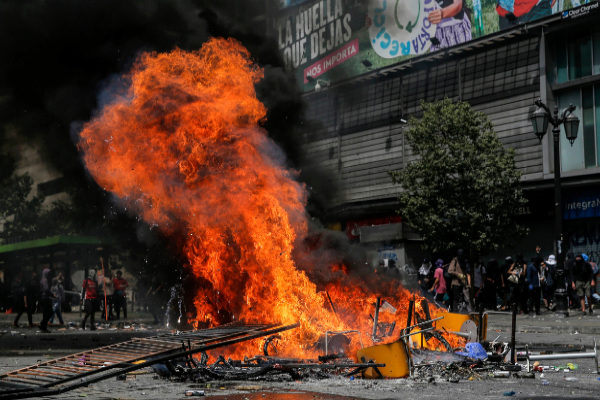- Chile.Sebastián Piñera apologizes to Chileans and announces a "Great National Agreement"
- Social outbreak, piñera, captive between the evil and the stagnation
- Album: Cartels against Piñera: "Soldier, don't shoot"
Chile lives its second day of general strike on Thursday, in the midst of a social outbreak that does not yield and translates into increasingly massive demonstrations and looting, which pressure President Sebastián Piñera, who fails to find a solution to the crisis.
On Wednesday, Chilean unions managed to gather tens of thousands of people in a march in Santiago. On Thursday, the second day of the strike, new mobilizations are expected that will require the military to leave the streets and the government will respond to this crisis, the most severe in three decades.
"What President Piñera has done so far is to polarize and stress the country. We have young people on the streets today with a rifle in their hands against their own countrymen," said Barbara Figueroa, president of the Unitary Central of Workers (CUT) Chile's most powerful union, in statements to journalists.
The grassroots organizations announced that they will hold a concentration on the Bulnes promenade, located a few meters from the Government Palace of La Moneda, where they expect to gather thousands of people from about twenty social movements that drive this strike.
So far, the demonstrations have left 18 dead , including a child, a Peruvian citizen and an Ecuadorian, according to government figures. In addition, there are 535 people injured -239 of them by firearms - and 2,410 arrested , according to a latest report by the National Institute of Human Rights (NHRI).
A crisis that does not yield
The massive demonstrations broke out on Friday because of the 3.75% increase in the price of the metro fare in Santiago, which was suspended. But this claim resulted in a much larger movement, heterogeneous and without an identifiable leadership , which puts other demands on the table, mainly an increase in the very low pensions of the private system that remains the legacy of the dictatorship of Augusto Pinochet (1973-1990 ).
"This is already the claim of an entire country, we get tired," shouted a protester in the middle of a crowd that blew their pans at the soldiers in Santiago.
The announcement of a battery of measures by President Piñera on Tuesday seems not to have had the desired effect. The government promised an improvement in the pensions of the poorest, the suspension of a 9.2% increase in electricity bills, an increase in the minimum wage, more taxes for those with higher incomes and a decrease in diets Parliamentary and high public salaries.
"We expected this moment of social conflict to increase sensitivity, but they are the same proposals from months ago , " lamented Izkia Siches, president of the Medical College, also present in the mobilizations.
On Tuesday, Piñera asked for "forgiveness" and acknowledged his "lack of vision" to anticipate the outbreak, two days after he claimed that the country was "at war".
Fifth curfew
Santiago and nine other Chilean regions lived their fifth consecutive night of curfew, with 20,000 military and police patrolling the streets and controlling the prohibition of circulation supported by helicopters.
The uniformed men also dedicated themselves to cleaning the remains of traffic lights, barricades and garbage that left the intense protest day on Wednesday in downtown Santiago.
Protests continued during the night from Wednesday to Thursday in some areas of the capital, with barricades placed by protesters who confronted law enforcement.
Four hotels were ransacked and neighbors dressed in yellow vests conducted surveillance rounds in peripheral communes to prevent theft, while expressing concern over the low presence of police and military.
Chilean state-owned Codelco, the world's largest copper producer, which was affected Wednesday by the demonstrations, resumed its activities and was functioning normally, according to company sources.
In the region of Valparaíso (center) there were attacks on toll booths on the route that connects it with Santiago, while protesters blocked important highways in the Araucanía region (south). The Chilean Ministry of Defense confirmed that it called reservists to deal with the social crisis, but ruled out they are used to patrol the streets.
According to the criteria of The Trust Project
Know more- Chile
- Sebastian Piñera
Revueltas Discontent spreads in Chile with President Piñera on the defensive
ChileNight of chaos, violence and death in a convulsed Chile
Questions with answers The keys to violence in Chile, from idyllic economy to vulnerable society

